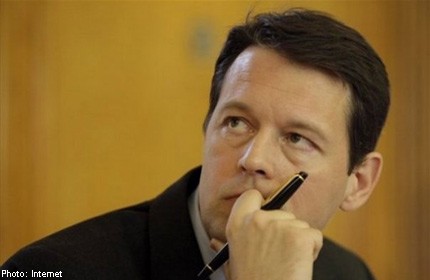Interpol chief hits back at writer who alleges Dan Tan was protected in S'pore

Untouchable. This was what one foreign journalist has called Dan Tan Seet Eng, the alleged mastermind of a football match-fixing ring.
The Canadian author and investigative journalist, Mr Declan Hill, claimed in a British Broadcasting Corporation (BBC) radio interview on Friday that Singapore authorities had "tolerated" match-fixing activities and were protecting the 48-year-old.
Tan, who is wanted in Italy and Hungary, was arrested with 13 others, including two women, by the Criminal Investigation Department (CID) and the Corrupt Practices Investigation Bureau (CPIB) last Tuesday.
The police have refuted Mr Hill's allegations, calling them "false" and "baseless".
They said in a statement on Monday: "The Singapore authorities reject these serious allegations which are false and have cast negative aspersions on the high standing and integrity of our enforcement and judiciary system.
"Should the BBC or its interviewees have evidence that substantiate any of the allegations made against the Singapore authorities, or on match-fixing syndicates in Singapore, we advise that you contact us immediately to share such evidence so that action can be taken."
A high-ranking official in Interpol said on Monday that such criticism was unfair, as the recent arrests by local police to fight match-fixing showed that no one is above the law.
Interpol secretary-general Ronald K. Noble told reporters: "Mr Declan Hill, he wrote a great book exposing the problems of match-fixing...
"But in his book, it seems all that he could do was criticise, criticise, criticise and not recognise that it is different to write an article accusing someone as compared to bringing charges against him."
He was speaking at the topping-out ceremony of the Interpol Global Complex for Innovation at Napier Road, next to the Gleneagles Hospital and Medical Centre.
Mr Noble highlighted in his opening speech the arrest of the 14 suspects, including Tan, whom "some thought might never be brought to justice".
He said those who seek publicity by criticising every positive development that occurs in fighting match-fixing "should simply open their eyes and look at the facts".
He confirmed that he was referring to what Mr Hill had said during an interview with the BBC World Service Radio last Friday.
Mr Hill has been promoting his new book on match-fixing, due to be published next month.
Mr Noble credited the success of the arrests to Singapore's efforts: "I was really proud that Singapore conducted this investigation on its own soil, with its own laws and resources and was able to bring so many people to justice."
He added that it was important that Tan, "the mastermind, the leader of the world's most notorious match-fixing syndicate", had been arrested by the Singapore authorities.
Significant arrest
Mr Noble said: "It's significant because the syndicate is considered the world's largest and most aggressive match-fixing (ring), with its tentacles reaching into every continent and its mastermind is one whom many believe is untouchable.
"It is significant to show that no one is above the law, especially in Singapore."
Several people, including the deputy chairman for the Government Parliamentary Committee for Law and Home Affairs, Mr Edwin Tong, also slammed Mr Hill over his "baseless" allegations.
Said Mr Tong: "We have zero tolerance on this, whether in sports or otherwise. I have no regard for his comments because they are totally baseless."
Lawyer Alfred Dodwell said that what can be done to nail match-fixing suspects is limited in terms of jurisdiction.
He said: "The law does not have the long arm to go and catch someone outside his own country. If Dan Tan has committed a crime overseas, he has to be extradited and extradition is a process. He cannot be prosecuted in Singapore if he didn't commit a crime in Singapore.
"Unless these are universal crimes (regardless of jurisdiction), you can only be prosecuted in the country the crime was committed."
What Hill told BBC
Asked by interviewer Alan Green about the significance of the 14 arrests last week, Mr Declan Hill told BBC World Service Radio last Friday:
“There has been a gang of match-fixing brokers living in Singapore for at least 20 years. They have fixed hundreds of matches around the world.
“The Singapore Government has known about their activities, has known about their presence in their island nation and has tolerated them and finally they are acting on it.”
Green: Tell us, who is Dan Tan? How did he operate and what are the allegations against him?
Hill: Well, they are all, of course, allegations. There are hundreds and hundreds of pages of evidence gathered by the Italian police force, by the Austrian police force, by the German police force, by the Finnish police force, by the Hungarian police force and a hundred international arrest warrants against him.
“I myself have seen the kind of activities that he does. However, to be fair to the man, he hasn’t had his day in court yet. And he needs to have this day to defend himself.”
Mr Hill later alleged: “In Singapore, I believe he’s getting protection. The extensive gambling, the extensive corruption in Malaysia, Singapore, Indonesia and Thailand, reaching into the influential establishment of both political and financial, and their ties with these ‘match-fixing brokers’ is long, is established and if we ever get Dan Tan on a witness box in a neutral country, like a European country like Germany, like all these other countries with international arrest warrants against him, I think the shock waves of what he would tell is really going to be profound for international football.”
chaihyn@sph.com.sg

Get The New Paper for more stories.